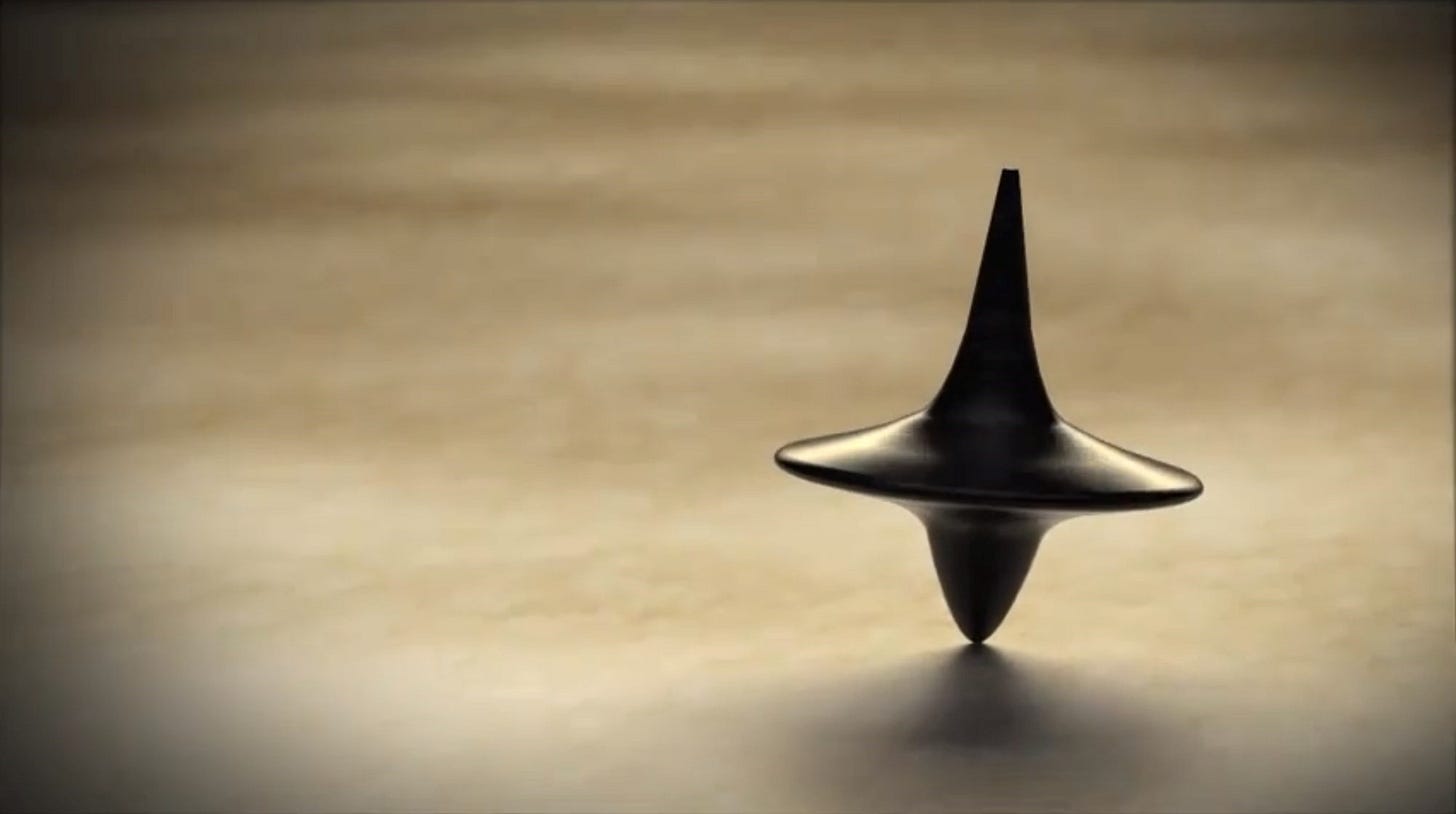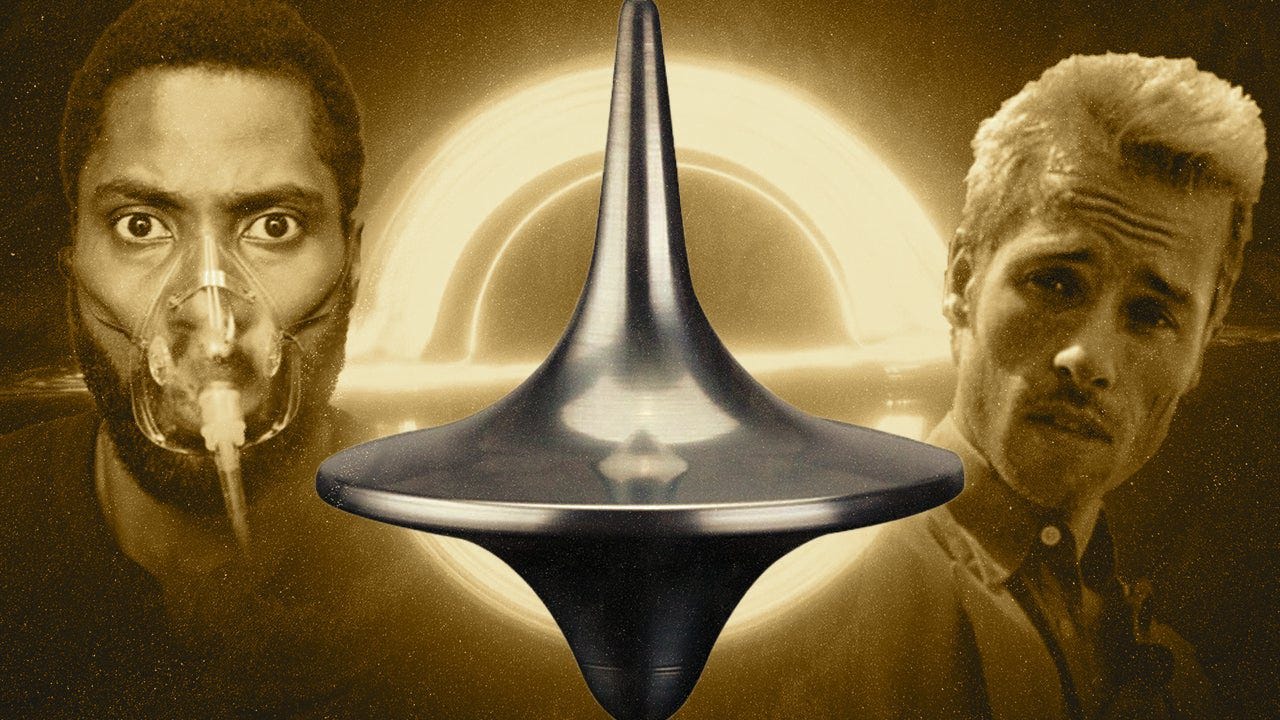You Must Become A Terrible Thought Part 1
After Some Sleight of Hand: Causal Clues in Christopher Nolan's Oeuvre That Post-Temporality Is Upon Us.
An excerpt from THE INTRODUCTIONS
Welcome to the dark night of our cell.
Wellcome to the #PRISONERSCINEMA’s special guest to nigh: the ProtAIgonist of tomorrow.
Welcome to our twenty-five-hour Undecuple bile.
We’re trolled overt and overt there’s a trolley problem by the muddled and backwards masked. While this awe full nihiltriumphalism drones in mighty Dolby, we can’t Hardy hear a murmur of a layer. Muffled dialog causes us enough stress that we relent to unelected overseers and extratemporal surveillors and ignore what’s really in play: Chaos and Order; Dreams and Time; Fear and Time; Time Dilation and Relativity; Sacrifice and Time; Inversion and Time; Time Manipulation; Memory and Identity; Illusion and Reality; and, forthcoming this Summer—scientific progress’ 1:1 relationship to the catastrophic progress accident.
Deafened by the salience of these ringing belles de Garis, who can defend a concept quite so silent as omnibenevolence, who can make out even Michael Shermer’s prayers, who can laugh when the clowns in Nolan world are the hostages and the doubters are the targets? Told we’re undesevering of a hiero, our vu becomes that the only way fearward is for civil liberty to be sacrificed at the alter of eternal vigilance.
Already a bit behind, we’re initiated into the Lag of Shadows, relieved we aren’t personally The Sacred Executioner. “The need to find a scapegoat, an object for projection of guilt, is a powerful psychological force. This need is not only individual but collective and can be used to account for much of the irrational violence in history.” Absent a sacrificial Elisa Lam however, our derive to do a great or terrible thing means we must become a terrible thought.
A terrible thought to think is that The Scare Caul possesses fear poisons that can cause us to question our séance of time.
A terrible thought is that Christopher Nolan knows something we don’t.
A terrible thought is just how TENET, singular tentpole film of the posttemporal, singular cinematic offering after the strictures of Covid19, leads directly into what OPPENHEIMER brings to market.
By way of brain-computer interfacing with the temporal lobe, we may be getting a head of our salves. Some Rodman may be Fallon behind. That’s because we’ve been Spiel-bound by the cypher of an altar-grating time signature that’s too much Wark to decode.
And then we’re condemned for not watching closely, even as we’re doubled up at first by a journeyman defensive specialist. All our Monarch twins absent their Monopolist hats were right in front of us all along. We can’t claim we weren’t give the unfacts of the fadograph of a yestern scene. We can’t claim we weren’t warned of Deleuzional discontinuity edits, “Montage is the operation which bears on the movement-images to release the whole from them, that is, the image of time.”
If, as we’re told, the dreaming subconscious is outside our control, then why warn the initiate not to “keep changing things like this.” Might the warning be against awakening from somnambulism to find ourselves “on the brink of new, terrifying possibilities” akin to what Siegfried Krakauer described of film’s precognitive predilections in the period From Caligari to Hitler, awakening to the helpless feeling of realizing the prestidigitator revelated the message a decade previous, “In my travels, I have seen the future... And it is a strange future indeed…”
The initiate is told they cannot control their own dreams because they don’t know they’re dreaming. A terrible thought presents itself, “An idea is like a virus, resilient, highly contagious, and the smallest seed of an idea can grow.” As the cock crows even after the clock stops, what’s incepted is “The smallest idea, such as, ‘Your world is not real.’ That simple little thought changes everything.”
What’s palindromic about the trust required of those destined to play a temporal leding part in each other’s chronologies when “everything is mere transition and change, nowhere duration and perseverance” is only the Ritual Sacrifice of Nolanized Time, again. We apologize for clogging up another kinodrome with yet more TENET times, but it’s always just in time for a singular summer release focused on the implications of time travel as the new normal.
We may be getting ahead of ourselves. Some road men may be fouling behind. Do you get it now?
Let us rankle Michael Shermer by believing weird things for a moment: if it was Stanley Kubrick who worked the moon landing into a shoot, after that Elon Experience—“We tried to warn them, this was futile”—would not a PRESTIGE impresario of Christopher Nolan’s production value be the first to break kayfabe?
Let’s ask a simple question: Why did Christopher Nolan debut by FOLLOWING a pattern of manipulation, break through with the rearward-looking MEMENTO; and then revelate the method in THE PRESTIGE as to how an INCEPTION of dream design takes hold by manipulating time? Why is his next film about the closest we’ve come to existential cataclysm?
The programmers contend that a temporal pincer movement proretends and repetends in this moment we are living. We know this because we have been down in the DUMBs lately. We know this because when life feels least real, like when we are in love, our psyches summon magnetic moments from the parallelogram of a passing future and a changing past to shore up an increasingly wobbly present.
When sleepwalking is our only mode of travel, it’s easy to forget that if we die in this dream, our fate is to awaken into one of two ЗЕРКАЛО dream-types Tarkovsky describes, “In one, the dreamer steers events. He controls what is happening and what will happen: He is a demiurge. In the other, he is incapable of control and is subjected to violence he can not defend himself against. Everything results in suffering and anguish.”
And so here we are awakening to accost the thief at the end; a thief ourselves, a victim of crime now every bit the criminal caught up in the sempiternal cubist cycle of abuse, abused cube clusters nested into persecutory child cube clusters nested into parent-level abused cube clusters curving recursively into the moral sympathy of the Mandelbrot set. If you are beaten by bullies, play their game three steps ahead of being three steps ahead and etc. Cubes exponentiate cleanly. Pray for us St. Nicholas, patron saint of repentant thieves. We simply hope to steal some assertion of meaning back for ourselves prior to the diachronic blurring of time backwards masked of its cataclysmic clarity just like any old nuclear atrocity advanced-warned of by the marquis at The Museum of Accidents.









